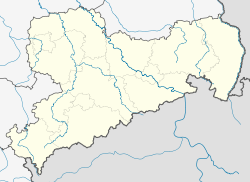 Leipzig Wilhelm-Leuschner-Platz station | |||||
| General information | |||||
| Location | Leipzig, Saxony Germany | ||||
| Coordinates | 51°20′08″N12°22′31″E / 51.335537°N 12.37531°E | ||||
| Line(s) | |||||
| Platforms | 2 | ||||
| Other information | |||||
| Station code | 8098 | ||||
| DS100 code | LLWP | ||||
| Category | 5 | ||||
| Fare zone | MDV: 110 [1] [2] | ||||
| History | |||||
| Opened | 15 December 2013 | ||||
| Electrified | at opening | ||||
| |||||

Leipzig Wilhelm-Leuschner-Platz is an underground railway station in the city of Leipzig, Germany. It was built as part of the Leipzig City Tunnel project and opened on 15 December 2013, enabling passengers to travel directly by rail from Leipzig Hauptbahnhof to the city centre.


